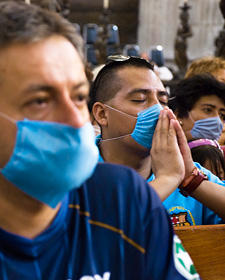At the time of writing, the World Health Organisation has just declared that the swine flu was a pandemic, meaning that they expect swine flu will affect all areas of the world.
 Going on past pandemics; the Spanish flu in 1918-19, the Asian flu in 1957-8 and the Hong Kong flu in 1968-70, pandemics have a significant impact on cities for periods of about two months. During this time it is likely that schools and child-care centres will be closed, and quite likely that church gatherings will also be stopped. In 1919, 0.2 percent of Australian people died.
Going on past pandemics; the Spanish flu in 1918-19, the Asian flu in 1957-8 and the Hong Kong flu in 1968-70, pandemics have a significant impact on cities for periods of about two months. During this time it is likely that schools and child-care centres will be closed, and quite likely that church gatherings will also be stopped. In 1919, 0.2 percent of Australian people died.
In Australia we are in a good position to weather a pandemic. We have a large stockpile of drugs to treat the flu and reduce the illnesses due to it. In fact one of the drugs used to treat the flu, Relenza, was discovered and developed in Australia. We are also one of the five major vaccine producers in the world, which probably means we get the vaccine first. Australia also has a comprehensive plan for managing a pandemic. You can read about it here. This is a good document to review if you are thinking through how to prepare your church to respond to a pandemic.
How should we respond to this threat? Here's a few ideas " I'm sure there are more.
Pray
During times of threat, countries tend to focus on national interests, and individuals on their own interests. This is a worldwide event " we need to be praying for people outside our own backyards.
Connect
This is an important time to connect with your neighbours. When people are quarantined for a week or two they often become quite frightened, especially if they are unwell or caring for unwell children or elderly people. A supporting neighbour to take meals around, do the shopping or even just chat on the phone can make a big difference. If the pandemic hits Sydney, I was thinking of visiting my neighbours and offering to swap phone numbers; that way if any of us are quarantined, we can let each other know and help out.
Expect
One great truth I learnt from the book of Revelation is that suffering causes Christians to grow in their trust of the Lord and non-Christians to wake up and turn to the Lord.
A few other thoughts that effect how we run church
If church meetings were cancelled for several weeks, how will you encourage people during what can be a frightening time of their lives. Can you podcast or vodcast the sermon? Are there resources to help smaller churches to do this? Is there a way for churches to keep in contact with each other and make sure everyone is OK? Could a Facebook group or message board on your church website achieve this? How do your small groups function " is this a way for people to look after each other?
If the pandemic hits, schools and preschools are often shut early. This can lead to major work disruptions as many people need to stay home and look after kids. How would you run your church if half your staff were unavailable? What would happen if the rector was quarantined?
How well resourced are the hospital chaplains in your area. Is there some way people in your church could assist them? Do they need some training?
Is your church responsible for a pre-school? Does it have a plan to respond to the pandemic? Face-washing, hand-washing and coughing and sneezing into a disposable tissue, or your arm rather than your hand are the most effective ways of minimising the spread of infection.
Is there some way your church could let your community know there are people to help those who are unwell, isolated and frightened? Is it worth getting a group of people together now to plan how your church will respond, rather than waiting till it is too late?
There are a few ideas, but I'm sure there are better ones out there. What do you think?
Photos courtesy Sarihuella and Eneas


























